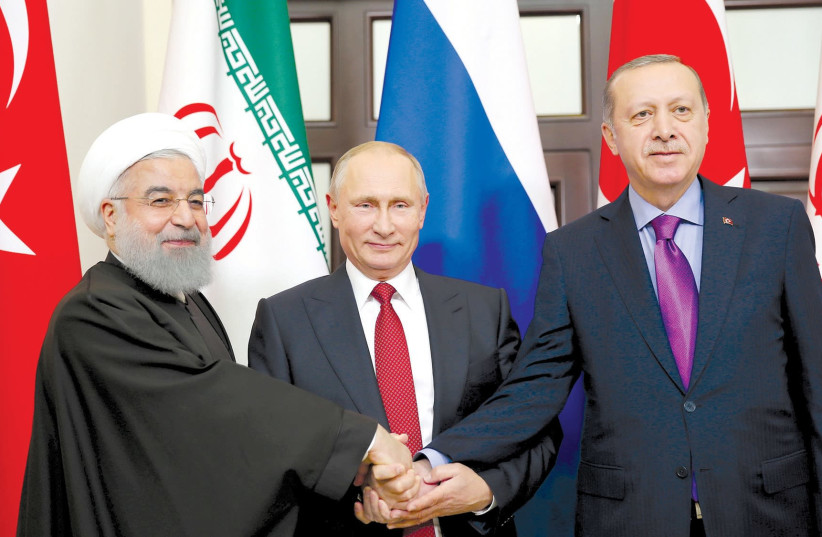For over 50 years, prior treaties, the START and the New START treaties held together the rickety skeleton that makes up the world’s nuclear weapons nonproliferation architecture.
Iranian nuclear weapons
Now that Russian President Vladimir Putin on Wednesday suspended this last piece of US-Russian nonproliferation cooperation (several other pieces had fallen by the wayside in previous years), does this make the Iranian nuclear threat worse?
From one perspective, the issues would seem to have nothing to do with each other.
The Islamic Republic has been trying to get nuclear weapons almost the whole time that START and then New START were in place.
As the US and Russia sent an estimated 25,000 notifications one to another and conducted 328 on-site inspections since 2011 to keep each other updated on the nuclear stockpiles, including allowing invasive inspections, Tehran was concocting one trick after another to avoid or fool international nuclear inspectors of its nuclear program.

The point is that the ayatollahs were going to try to achieve nuclear weapons regardless of whether broader trends regarding nuclear weapons nonproliferation were up or down.
They did not care how solid new START was in keeping a ceiling on the US-Russia’s nuclear stockpile of thousands of weapons, representing around 90% of the world’s supply, so long as they could get a few of their own.
But there is another perspective.
Good or bad in broader terms, the 2015 JCPOA Iran nuclear deal delayed the ayatollahs from achieving a nuclear weapon for some period of years.
A critical piece of the JCPOA was that Tehran shipped out its excess enriched uranium to Moscow after the 2015 deal was sealed and was due to do the same again if a return to the JCPOA had been navigated.
“Excess” means that the Islamic Republic dropped in 2015 from having uranium for 10 nuclear weapons to enough for less than one-third of one weapon. If the process repeated itself now, the ayatollahs would have needed to give up enough material for around five nuclear weapons.
Yet, all of this was based on the premise that the West could trust Russia to deal with the uranium in a way that would neutralize the Iranian threat.
All of this was in an environment where US and other nuclear inspectors regularly got physical and electronic updates and inspections of Russian nuclear facilities. This made it easy to also confirm that Putin did not play any double games with Iran’s uranium.
In fact, from 2015-2019, there were no signs that Russia violated its duty regarding Iranian uranium.
No one thinks that a return to the JCPOA is immediate.
First, Iran would need to stop selling drones to Russia to harm Ukraine. Second, the ayatollahs would need to drop some of their new concessions they asked for in August-September 2022 after a new deal was all but signed.
But now there would be another major problem.
Where could Tehran ship out its excess uranium?
Would the West trust Russia? Would they trust Russia in a situation where there was much less or zero transparency in terms of physical inspectors looking over Moscow’s nuclear facilities?
There is an ongoing debate about whether a return to the JCPOA would be good or bad for Israel in the current circumstances. But no one thinks it would be bad to get Iran to ship its five-potential-weapons-worth of uranium stock out of the country. It is now unclear how to solve that issue.
Besides that issue, global trends do matter.
In an atmosphere where non- or reduced-proliferation is an ironclad principle for most countries, even Russia, for Iran to stick out with its nuclear program has major costs.
But if there is a new nuclear arms race over the horizon now that Moscow suspended the last major arms control measure between it and the US, any other nuclear violator, including Iran, does not look all that bad or rogue.
Whatever the exact impact may be on Iran’s nuclear program from Putin pulling out of New START, nothing good will come of it and it could make things much worse.
